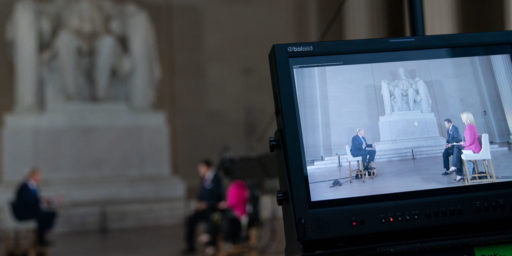What Americans Know: Not Much
A new Pew survey finds that Americans are not particularly knowledgeable about current events. This is consistent with every other survey ever done on the subject.
Since the late 1980s, the emergence of 24-hour cable news as a dominant news source and the explosive growth of the internet have led to major changes in the American public’s news habits. But a new nationwide survey finds that the coaxial and digital revolutions and attendant changes in news audience behaviors have had little impact on how much Americans know about national and international affairs.
On average, today’s citizens are about as able to name their leaders, and are about as aware of major news events, as was the public nearly 20 years ago. The new survey includes nine questions that are either identical or roughly comparable to questions asked in the late 1980s and early 1990s. In 2007, somewhat fewer were able to name their governor, the vice president, and the president of Russia, but more respondents than in the earlier era gave correct answers to questions pertaining to national politics.
This, presumably, is a function of a similar percentage of the public in both years being interested in the news. Indeed, those who are not particularly concerned about news can more easily avoid it, thanks to the proliferation of alternatives, whereas news junkies have an almost infinite variety of options.
I’m surprised that fewer people can name the VP now, given that Cheney’s name is so widely bandied about. Then again, so was Dan Quayle’s. It’s not at all surprising that Mikhail Gorbachev was better known than Vladimir Putin, since he was not only a much more important public figure but Russia was much more prominent on the American radar screen then than now. I haven’t even a guess as to the drop in knowledge of state governors.
The survey provides further evidence that changing news formats are not having a great deal of impact on how much the public knows about national and international affairs. The polling does find the expected correlation between how much citizens know and how avidly they watch, read, or listen to news reports. The most knowledgeable third of the public is four times more likely than the least knowledgeable third to say they enjoy keeping up with the news “a lot.”
There are substantial differences in the knowledge levels of the audiences for different news outlets. However, there is no clear connection between news formats and what audiences know.
Well-informed audiences come from cable (Daily Show/Colbert Report, O’Reilly Factor), the internet (especially major newspaper websites), broadcast TV (NewsHour with Jim Lehrer) and radio (NPR, Rush Limbaugh’s program). The less informed audiences also frequent a mix of formats: broadcast television (network morning news shows, local news), cable (Fox News Channel), and the internet (online blogs where people discuss news events).
Ultimately–and, again, not at all surprisingly–demographics matter:
Distinct patterns emerge when these results are analyzed by key demographic groups. Education proves to be the single best predictor of knowledge. Holding all other factors equal, levels of knowledge rise with each additional year of formal schooling. At the extremes, these educational differences are dramatic: People with postgraduate degrees answer, on average, about 17 of the 23 questions correctly, while those who did not finish high school average only about eight correct answers.
Other demographic differences are also striking. Men, on average, knew more than women, all other factors being equal. Older Americans – particularly those 50 years old or older – did better than younger people. Whites scored better than blacks, while more affluent Americans knew more than those with lower household incomes.
My guess is that if one factors in the demographics, differences among sources goes away. NPR listeners aren’t more informed than Fox News listeners because of superior content so much as because the former draws a more affluent, educated audience.
I’m a bit dubious of the low scores blog readers get, though, given the surveyed demographics reported by everyone who researches that sort of thing. Political blogs draw an incredibly educated, affluent demographic.





Jay Leno has a regular feature on The Tonight Show he calls “Jay walking”. In the feature he takes a microphone, walks down the street, and asks simple factual/current events questions of the people he encounters. The level of ignorance is, while perhaps not surprising, rather disturbing, so I’m not surprised by these findings.
I’d be interested in knowing what “political discussion blogs” were sampled. I suspect you get a somewhat different demographic from DU than OTB.
Maybe I missed it but I don’t think they specified political blogs, they say “discussion blogs.” I agree that if they focused on people who read political blogs they’d probably be seeing a much more aware group (since the topic is politics), but most likely someone who starts every day going to cuteoverload.com is going to answer that question as yes, they read a discussion blog frequently.
Good point on the operational definition used on “discussion blogs.”
Why exactly do we push for higher voter turnout and judge high turnout as a success?
Because when you get a 50% turnout you have to wonder which 50% it is: the informed 50% or the 50% that couldn’t find China on a map.
So, what’s failing here? The educational system or the political system? I bet if you asked the same groups of people what products were being advertise by the following, they could tell you.
Dude, you’re getting a XXXX
Don’t leave home without it
There’s always room for XXXXX
Lost another loan to XXXXXXX
Ah, the power of XXXXX
Mmmmm, Mmmmm Good
Eat fresh
Love that chicken at XXXXXX
and so on.
Or, maybe our political leaders don’t really want people to be able to answer these questions.
Do you think Jay picks the dumbest ones for broadcast? Do they interview a representative set of people?
“Why exactly do we push for higher voter turnout and judge high turnout as a success?”
Because we live in a democracy – the principle of which is that the people get to choose their government, irrespective of how stupid the people may be.
This reminds me of a project I did for my “Survey Methods” class when I was getting my political science degree. I asked fellow students to name their elected representatives from President down to County/City Council. If I remember correctly (it’s been 26 years), about 90% could name the President and 75% the Vice-President. After that it dropped precipitously, with the exception of political science majors. And this was in November of an election year. (I gave one guy credit for knowing the incoming President, even though he couldn’t remember the sitting one.) So, I’ve known for a long time that most people just don’t know this stuff.
Generally true except for the notable case of Stewart/Colbert viewers – who, being generally younger, should have been expected to score low – but instead scored higher than all others.
Generally true except for the notable case of Stewart/Colbert viewers – who, being generally younger, should have been expected to score low – but instead scored higher than all others.
But these are people choosing to either watch a politics show during prime social hours or TiVoing or otherwise time shifting the shows. That makes them, almost by definition, political junkies. Indeed, that largely explains why Rush Limbaugh listeners are so well informed.